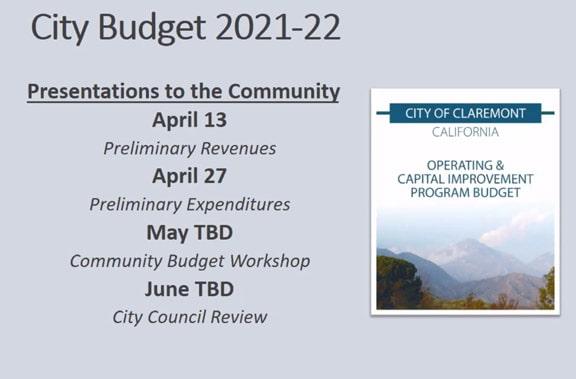Looking forward at annual ‘State of the City’

by Steven Felschundneff | steven@claremont-courier.com
The state of the city was aptly summarized in the chosen format for the Chamber of Commerce’s annual State of the City address—a group Zoom meeting.
In his opening remarks, Randy Lopez, executive director of the chamber, said last year’s State of the City meeting was the last in-person group gathering in Claremont, taking place just days before the governor’s stay-at-home-order.
Mayor Jennifer Stark, and the rest of the city council, had plenty to report even as the city is still very much bound by continued struggles—both financial and personal—brought on by the pandemic.
During last Thursday’s rather upbeat meeting, the mayor introduced city staff and thanked them for their hard work during the pandemic, efforts that made it possible for the council to report the city’s collective accomplishments.
“This has been a rough year. Your commitments to the city of Claremont and the hard work and talent of your teams is deeply appreciated and we are so grateful that you choose to serve Claremont,” Mayor Stark said.
She recalled how during last year’s State of the City then-Mayor Larry Schroeder stated the biggest challenge facing Claremont was the structural budget deficit. That priority was quickly eclipsed by the swift shutdown of most city services because of the coronavirus, making it even more daunting for the city to balance the budget.
For a year and counting, Claremonters have endured closures, reopenings and closures again. But most importantly, 54 Claremont residents have died as a result of the virus.
“While we all struggled with the loss of so many things we took for granted like parties and gatherings, a large part of our community has been devastated by the loss of jobs, businesses, and most importantly the loss of loved ones due to COVID-19,” Mayor Stark said.
“If you take one thing from this State of the City presentation, let it be hope. We are resilient. We have gone through tremendous challenges as a community. We have dared to examine our weaknesses and have fortified our strengths.”
Councilmember Sal Medina highlighted economic development during the pandemic including the al fresco program which helped local restaurants survive. He mentioned how strong automobile sales helped the city’s budget and noted that the new Mazda dealership broke ground this last year.
Councilmember Jed Leano spoke about the challenges the city faces in providing affordable housing, especially the ongoing effort to update the city’s Housing Element, under which Claremont must show a plan to build 1,711 additional housing units to meet its goal under the state’s Regional Housing Needs Assessment. He noted recent successes including the affordable senior housing currently under construction on Base Line Road and a possible future affordable development on the land just west of Pilgrim Place.
Councilmember Ed Reece commented that the new Psychiatric Assessment Care Team, which will respond to certain non-emergency, non criminal calls to the police, was approved and will be in service in the near future. Claremont has once again been named one of the top 100 safest cities and the police department will soon be implementing body worn cameras.
Councilmember Corey Calaycay covered infrastructure improvements including a $3 million seismic and safety update for Claremont’s police station, a $2.5 million makeover of Towne Avenue paid for by gas tax funds and an update to the city’s sustainability plan.
In response to a participant’s question, City Manger Adam Pirrie said that Claremont will receive $6.83 million from the federal government under the American Rescue Act recently signed into law by President Joe Biden. Claremont will receive half of the funds within the next several months and the remainder in about a year, and the city will have until December 2024 to spend the money.
Claremont resident Jess Swick asked Mr. Pirrie if the windfall from the government could be used to pay down the city’s debt to Golden State Water associated with the failed bid to take over the water company. Mr. Pirrie responded that that was likely an ineligible expense.
Mr. Pirrie told the COURIER on Monday that the city is “still trying to determine exactly what expenditures the funding is eligible for and will need guidance from the federal government to ensure that it is spent appropriately.” He will attend webinars over the next few weeks to determine how the money can be spent.
The meeting concluded with a question and answer period including an extemporaneous presentation on the state of the schools from acting Superintendant Julie Olesniewicz.
In closing, Mr. Lopez, executive director of the chamber, said the plan is to be together in person next year for the State of the City 2022.









0 Comments